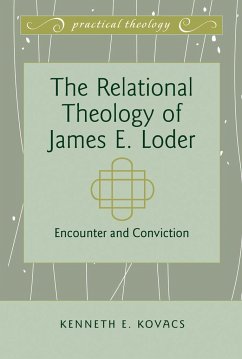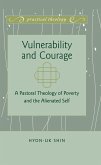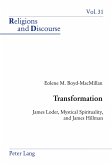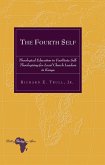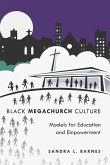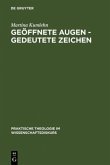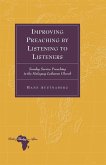The work of practical theologian James E. Loder, Jr. (1931-2001) deserves a wider audience. For more than forty years, he developed and exercised an interdisciplinary methodology that identified patterns of correlation in the fields of psychology, educational theory, phenomenology, epistemology, and physics, producing a compelling theological vision that centers on the person and work of the Holy Spirit engaging and transforming human life. At his untimely death in November 2001, Loder was the Mary D. Synnott Professor of Philosophy of Christian Education at Princeton Theological Seminary, where he lectured primarily in the areas of human development and the philosophy of education.
This book introduces and examines, explores and untangles the complexity of Loder's thought in order to make it more accessible to a broader audience. At the core of Loder's work is a relational phenomenological pneumatology of inestimable value to the theologian engaged in the ongoing renewal of the church. The Christian life is preeminently relational, distinguished by a relationship with God constituted by Jesus Christ, and sustained by the Holy Spirit. Relationality, Loder claims, takes place in and through the life of the Holy Spirit who operates within a complementary relationship with the human spirit, through an analogia spiritus: a profound, transformational interrelation of the Holy Spirit and the human spirit. The Holy Spirit, intimately connected to the person and work of Christ, takes up and extends the work begun in the incarnation by enfleshing the presence of Christ, thus transforming human life. Loder is distinctive for articulating a pneumatology that incorporates 'how' the self participates in the relationship and the way the self, through the relationship, comes to have a full knowledge of itself, the world, and God. It is precisely the logic of this Christomorphic dynamic that has extraordinary implications for the way we attempt to fathom the depths and convey the meaning of Christian experience. Loder's relational phenomenological pneumatology contains rich and principally unrecognized resources for providing new frameworks for the Christian life.
This book introduces and examines, explores and untangles the complexity of Loder's thought in order to make it more accessible to a broader audience. At the core of Loder's work is a relational phenomenological pneumatology of inestimable value to the theologian engaged in the ongoing renewal of the church. The Christian life is preeminently relational, distinguished by a relationship with God constituted by Jesus Christ, and sustained by the Holy Spirit. Relationality, Loder claims, takes place in and through the life of the Holy Spirit who operates within a complementary relationship with the human spirit, through an analogia spiritus: a profound, transformational interrelation of the Holy Spirit and the human spirit. The Holy Spirit, intimately connected to the person and work of Christ, takes up and extends the work begun in the incarnation by enfleshing the presence of Christ, thus transforming human life. Loder is distinctive for articulating a pneumatology that incorporates 'how' the self participates in the relationship and the way the self, through the relationship, comes to have a full knowledge of itself, the world, and God. It is precisely the logic of this Christomorphic dynamic that has extraordinary implications for the way we attempt to fathom the depths and convey the meaning of Christian experience. Loder's relational phenomenological pneumatology contains rich and principally unrecognized resources for providing new frameworks for the Christian life.
«Carefully tracing the genesis and development of James E. Loder's pioneering inter-disciplinary methodology in psychology, philosophy, and theology, this book provides invaluable insight into the Christian mind and convictions of one of the leading North American practical theologians of the late twentieth century. Lay people, pastors, and theologians will benefit greatly from this much-needed companion to Loder's challenging and inspiring writings.» (Thomas John Hastings, Associate Director, Center of Theological Inquiry, Princeton, New Jersey)
«This book goes to the heart of one of the major issues facing the church today: how are Christians transformed? In his exploration of the work of the late James E. Loder, Kovacs demonstrates that Loder was the premier expositor of Christian transformation, drawing on theology, philosophy, psychology, physics, and his own spiritual counselling practice to present Christian transformation as something different from 'normal human development.' Without a deep appreciation for this difference, churches become places that socialise people into a Christian version of achievement addiction, institutional maintenance, and nostalgia. Urging church leaders, educators and all Christians to replace Christian socialisation with Christian transformation, Kovacs' text is for the cynical and the hopeful. Read it, meditate on its implications, and apply it.» (Eolene Boyd-MacMillan, PRRG, Faculty of Divinity, University of Cambridge; Department of Counselling and Psychotherapy, School of Health in Social Science, University of Edinburgh; Children and Young People's Counselling Service, CrossReach Counselling: Lothians, Edinburgh, Scotland)
«Truth, profundity, clarity: Loder's work traffics in deep truths. Kovacs' book brings them up to clarity.» (Marilyn McCord Adams, Distinguished Research Professor of Philosophy, The University of North Carolina at Chapel Hill)
«The best Christian theology is rooted identifiably in the life and worship of the Church in the midst of the world, and speaks naturally rather than in any forced or recondite manner to the practical concerns of faith. This sensitive and judicious study of James Loder's thought lays bare these same vital connections, and in doing so makes its own generous contribution to the pursuit of a practical theology which is theological, and for that reason practical.» (Trevor Hart, Professor of Divinity, St Mary's College, University of St Andrews, Scotland)
«This book goes to the heart of one of the major issues facing the church today: how are Christians transformed? In his exploration of the work of the late James E. Loder, Kovacs demonstrates that Loder was the premier expositor of Christian transformation, drawing on theology, philosophy, psychology, physics, and his own spiritual counselling practice to present Christian transformation as something different from 'normal human development.' Without a deep appreciation for this difference, churches become places that socialise people into a Christian version of achievement addiction, institutional maintenance, and nostalgia. Urging church leaders, educators and all Christians to replace Christian socialisation with Christian transformation, Kovacs' text is for the cynical and the hopeful. Read it, meditate on its implications, and apply it.» (Eolene Boyd-MacMillan, PRRG, Faculty of Divinity, University of Cambridge; Department of Counselling and Psychotherapy, School of Health in Social Science, University of Edinburgh; Children and Young People's Counselling Service, CrossReach Counselling: Lothians, Edinburgh, Scotland)
«Truth, profundity, clarity: Loder's work traffics in deep truths. Kovacs' book brings them up to clarity.» (Marilyn McCord Adams, Distinguished Research Professor of Philosophy, The University of North Carolina at Chapel Hill)
«The best Christian theology is rooted identifiably in the life and worship of the Church in the midst of the world, and speaks naturally rather than in any forced or recondite manner to the practical concerns of faith. This sensitive and judicious study of James Loder's thought lays bare these same vital connections, and in doing so makes its own generous contribution to the pursuit of a practical theology which is theological, and for that reason practical.» (Trevor Hart, Professor of Divinity, St Mary's College, University of St Andrews, Scotland)

